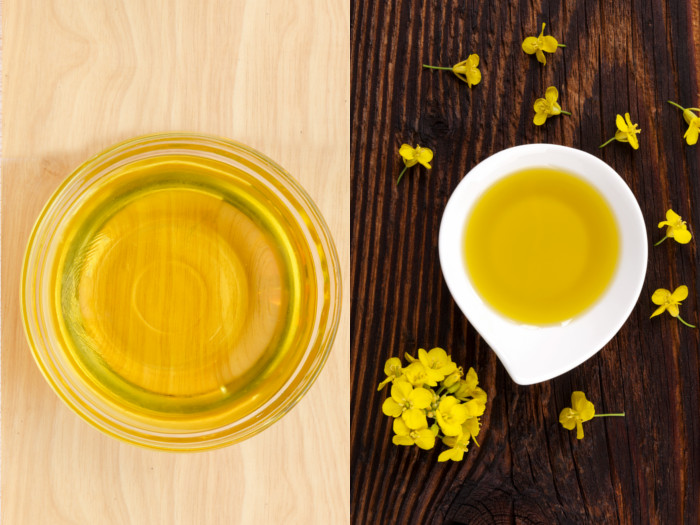There has long been a debate about canola oil vs vegetable oil, and while both have certain advantages, it is important to understand how these two popular oils are different.
Canola Oil vs Vegetable Oil
When deciding whether to use canola oil or vegetable oil in your cooking, there are a number of factors to consider.
Source
- Canola oil is a type of vegetable oil that is typically derived from rapeseed, although other oils pressed from cultivars of the Brassicaceae family also commonly go by the name canola oil.
- Vegetable oil is a general term defined as triglycerides or fats that have been extracted from a plant. Coconut oil, olive oil, safflower oil, canola oil, soybean oil, and palm oil are all technically vegetable oils.

Canola oil and vegetable oil can often be used interchangeably in cooking Photo Credit: Shutterstock
Extraction
- The process to go about extracting canola oil can be quite complex, with a number of chemical solvent extractions, although cold-pressed varieties are available on a more expensive and limited basis. [1]
- Vegetable oils can be extracted from various plants using various solvent extractions which are chemical in nature. Also, you can find are cold-pressed varieties of vegetable oils easily.
Nutrition
- Canola oil is a very rich source of monounsaturated and polyunsaturated fatty acids, including particularly high levels of omega-9 fatty acids (oleic acid), as well as good amounts of linoleic and alpha-linolenic fatty acids, all of which can be beneficial for the body in various anti-inflammatory and heart-healthy ways. There are also low levels of saturated fat. [2]
- The nutrition of vegetable oil may vary depending on the plant from which it is extracted. Vegetable oils can have vastly different nutrient compositions and characteristics. [3]
Uses & Smoke Point
- When it comes to cooking, canola oil has one of the highest smoke points of common cooking and vegetable oils, at 460 degrees Fahrenheit (238 C).
- Vegetable oil is often preferred for frying foods, as the breakdown of the beneficial fatty acids isn’t as important in those preparations, and because vegetable oil tends to be less expensive, and a lot is required for frying. Different oils have a different smoke point and these oils are liquids at room temperature. [4]
Flavor
- Like most heavily processed oils, there is a little flavor to canola oil, making it versatile as an ingredient.
- Vegetable oil also lacks a distinct flavor, as it tends to be highly refined.
One thing to remember about canola oil is that is doesn’t come from a natural plant, in most cases, but in a crossbreeding situation, one that often includes genetic modification. In turn, this means that the plant may be sprayed with various pesticides or chemicals throughout its development. [5]
Which is Better For You?
Generally speaking, canola oil is considered healthier than vegetable oil, since the latter often has higher levels of saturated fat and is more commonly hydrogenated. Vegetable oil also doesn’t hold the flavor of foods particularly well and is commonly seen as a tool in a recipe, rather than an ingredient. The best advice is to choose even healthier oils than these types, such as avocado oil, extra virgin olive oil, grapeseed oil or sesame oil, both for their flavor and nutrient composition. [6]
How to Store Cooking Oils
Cooking oils often go rancid when they are exposed to oxygen and this leads to a foul smell and bad taste. Hence, it is important to know how to store oils.
- Always store the cooking oils in a cool and dry place away from heat and sunlight exposure.
- Wrapping the oil bottles with aluminum foils also helps protect them from sunlight and may help increase the shelf life.
- If you purchase cooking oils in bulk, then make sure to transfer some portion for your daily use in a different bottle and store the rest of the oil in a refrigerator.
- Whenever you buy oils infused with herbs and vegetables, make sure to keep them in the refrigerator after opening the bottle. This will help protect the oils against bacterial growth.
Note: Usually, cooking oils have a shelflife of about three to five months, so make sure to buy and use these oils accordingly.
